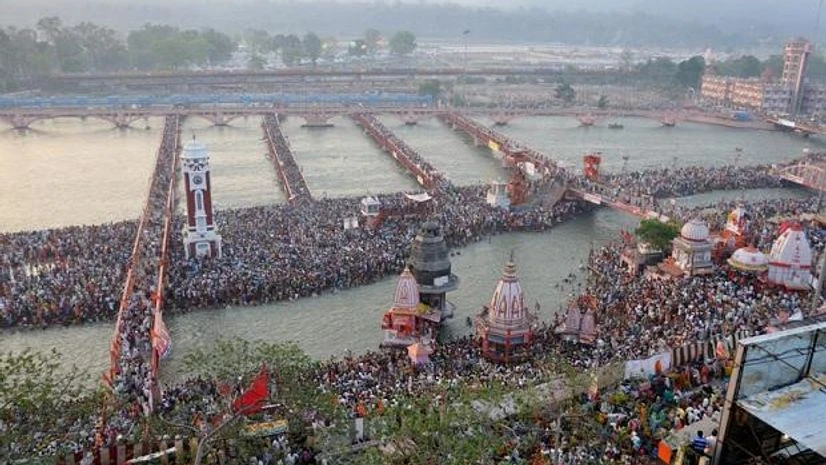The Maha Kumbh in Allahabad starting next month could spell trouble for lakhs of workers, tanners, and meat and leather exporters in view of the Uttar Pradesh government's order to close tanneries and meat factories in Kanpur and Unnao for three months during the congregation.
The state government has ordered the closure of tanneries between December 15 and March 15 in the cities of Kanpur and Unnao to provide clean water to devotees participating in the upcoming Ardh Kumbh festival.
The Kumbh Mela is to be held in Allahabad between January 15 and March 4, 2019.
According to the Uttar Pradesh State Industrial Development Corporation (UPSIDC), 264 small and big tanneries operate in Kanpur and Unnao.
Those in the business say these tanneries are the primary source of income and livelihood for over one lakh families. "Small-scale tanneries are likely to be the worst affected by the government's order," says the owner of one of the smaller units.
Taj Alam, the president of the UP Leather Industries Association (LIA), told PTI the state government's move has come as a shock for the leather industry and meat processing units which are already in the red.
More From This Section
Alam said the complete closure of tanneries could spell trouble for over three lakh workers who hail from socially and economically backward community and are engaged in the industry.
The leather and leather goods export business and domestic sales from Kanpur and Unnao is around Rs. 20 billion a month each and the complete closure would hit business worth over Rs. 120 billion, Alam feared. "There will be large-scale job loss if the ban is not revoked."
He said he has apprised top officials of the Union Commerce Ministry about the past practice of closing tanneries just for three to four days at a time before the days assigned for the 'shahi snan' (holy bath).
The meat processing industries which are mostly in the Unnao district would also be affected as it would not be able to dispose of hide and other byproducts if the tanneries remained closed, he said.
Unnao district has seven meat processing units with a combined annual turnover of Rs 100 billion. The winter days are its peak season and the ban on tanneries will seriously hit the meat export business.
Alam said the effluent released from tanneries into the Ganga may not be even half as polluting as the untreated water released from various towns along the river.
The tanners treat the water thrice before releasing it into the river, Alam said, adding the water from the plants is diverted to Rai Bareli and 80 per cent of the waste water does not reach the Ganga and this has been shown in the inquiry report made jointly by top administrative and and irrigation department officials of Unnao district just a fortnight back.
Alam claimed that the Union commerce ministry has written to the UP chief secretary advising against the three-month ban on tanneries and meat units, which it feels is illogical as the holy bath takes place only on certain days.
Regional Officer pollution control board (PCB), Kuldeep Mishra, however, denied claims of complete closure of tanneries in Kanpur.
To be precise, 249 tanneries have been asked to operate at 50 per cent of average capacity, he said.

)
